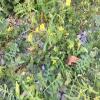By David Dodd
Here’s the plan—each week, I will blog about a different song, focusing, usually, on the lyrics, but also on some other aspects of the song, including its overall impact—a truly subjective thing. Therefore, the best part, I would hope, would not be anything in particular that I might have to say, but rather, the conversation that may happen via the comments over the course of time—and since all the posts will stay up, you can feel free to weigh in any time on any of the songs! With Grateful Dead lyrics, there’s always a new and different take on what they bring up for each listener, it seems. (I’ll consider requests for particular songs—just private message me!)
When my Deadhead friends learn that my daughter’s name is Rosemary, they sometimes ask—is she named for the song? And, while my wife can truthfully and vehemently answer in the negative, I have to wonder if the name might have made the final list of potential names for our possible daughter-to-be had there not been the song, “Rosemary.”
For one thing, I definitely had already done the research on the name, its history and meaning, the significance of the herb, the Shakespeare connection, and all that, before we had to grapple with creating our list of possible names. Some obvious ones never made the list, like, say, Cassidy, or Althea… Too obvious. But Rosemary is a beautiful, under-used, old-fashioned name, and it has good botanical associations.
Rosemary graduated from high school today (I’m writing this on June 7), and so, I want to write something in her honor, since she is on my mind a great deal. I promise not to dwell too much on my fabulous wonderful daughter, but I do just want to say how proud I am of her, and how I so look forward to following along as life goes forward. I am a lucky dad. So, she is not Clare, and she is not Grace, and she is most definitely NOT Iphigenia, but she is perfectly Rosemary.
Aoxomoxoa contains so much treasure to be sought and mined. Really, the whole album offers jewels to the sunset. The delicate tune and words that are “Rosemary” always seemed to slide into my brain sideways, almost as if sneaking in through a door that was shutting. The filter on the vocals, as with at least one other song on the album, does quite a bit to obscure the actual beauty of the melody, but in the case of “Rosemary,” I think the obscurity is an excellent effect.
Just listened to the (only?) live version from December 7, 1968, at Bellarmine College in Louisville, Kentucky. Extremely quiet recording—had to crank up my volume all the way on the computer to hear it. But wonderful. Delicate, sensitive performance.
I think this is one of those songs constructed intentionally by Garcia (and Hunter?) to be a fragment. They’ve talk in interviews about loving the old, collected songs that were fragments. But there is a story hiding in there. Or, more likely, a riddle seeking to be solved. The form is evocative of elaborate story-riddles, whose solution is always a surprise, but self-evident once revealed. I’m hoping that we can engage in a collective attempt at solving the riddle that is “Rosemary.” Or at least, have some fun trying.
It seems that what we have is only a roughly-sketched description of the “she” (Rosemary?) in the lyric. At first, it seems she is only the reflection of the garden itself, which, eventually dying, leaves a walled enclave that is destined to remain devoid of life henceforth. But the first line indicates that she has boots of leather—or, at least, that there are leather boots somewhere. Maybe they were not hers?
Reflections abound in Aoxomoxoa, which is, itself, a mirror-word. The album artwork, name, and imagery scattered through the songs speak to reflections. We encounter this motif throughout Grateful Dead lyrics and iconography—beginning with “Dark Star”: “Mirror shatters in formless reflections of matter…” So the mirror that is a window shows a reflection of the viewer that is really that which she sees through the window. I am reminded of the acid test saying: “Inside is outside. How does it look?”
I think that the object for which the riddle is trying to provide hints at identification is the “there” referred to in the final line (and the legend on the wall) of the song: “No one may come here since no one may stay.” So, what is the walled garden? It holds plants (perhaps even rosemary—the herbal symbol of remembrance), as well as colors (scarlet, purple, crimson, blue) and fragrances (a breath of cologne).
“She came and she went, and at last went away.” Hmmm…. In and out of the garden she went. We all were, by Judeo-Christian mythology, banished from The Garden, so we all went away at last. What was contained in that Ur-garden? Innocence, surely. A state of un-knowing, since it was by eating of the tree of knowledge that we were banished.
That space enclosed by the garden walls has been a riddle since the beginning of recorded stories. Maybe, actually, the greatest story ever told, since it seems, at its core, to relate to what it is that makes us human. What is our consciousness? What is knowledge? We cannot stay in a place of unknowing, much as we might try to empty our minds, through any number of spiritual paths, to reach—what? Nirvana, heaven, whatever form of enlightenment. Home, perhaps? In its deepest sense? A place to which we might try, but never really will be able to get back?
OK—I am speculating far too much here. I would really like to hear what everyone else might have to say. Is this a riddle? Does it have an “answer”? (And what would be the answer to the Answer Man, anyway?)
Mirrors within mirrors. Time to reflect!



